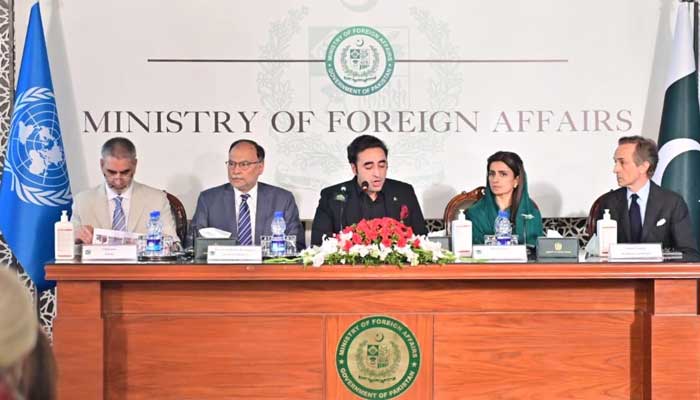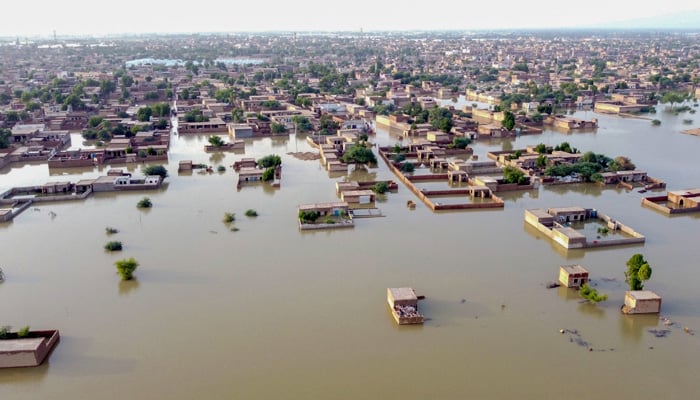‘Pakistan needs world’s help’: UN launches $160m flash appeal for flood victims
The FRP will complement the government’s overall humanitarian response to the recent floods caused by unprecedented rains in Pakistan
The United Nations (UN) on Tuesday jointly launched a flash appeal for $160 million to help Pakistan cope with the flood devastation that has inflicted a $10bn loss on the country’s economy and claimed more than 1,100 lives so far.
Pakistan and the UN have simultaneously launched the "2022 Pakistan Floods Response Plan" in Islamabad and Geneva today. The FRP will complement the government’s overall humanitarian response to the recent floods caused by unprecedented rains.
In a video message for the launch of the appeal, UN Secretary General Antonio Guterres said, “Pakistan is awash in suffering.”
He maintained that the people in Pakistan were facing a monsoon on steroids — the relentless impact of epochal levels of rain and flooding.
In his keynote address at the launch of the event in Islamabad, Foreign Minister Bilawal Bhutto Zardari said, “We are in the midst of the climate catastrophe of the decade, one that has ravaged the entire country in a humanitarian disaster of unimaginable scale and magnitude.
He maintained that heart-wrenching scenes of loss, damage and despair have defined this super-flood as a climate calamity, through which we strive even today to reach our fellow citizens to provide crucial rescue and relief assistance.
The foreign minister said that the country has been battling one of the most severe, totally anomalous cycles of torrential monsoon weather since mid-June
“Rainfall during this period has been equivalent to 3 times the 30-year national average, with many areas challenged with facing down 5-6 times and even more,” he added.
Unprecedented levels of cloudbursts, torrential and uninterrupted rain have caused widespread devastation, triggering both urban flooding, river floods, hill torrents and landslides, resulting in loss of human lives, livelihoods and livestock, and severe damage to property and infrastructure, Bilawal said.
The foreign minister feared that the scale of the disaster well exceeds that of the 2010 mega-floods.
72 districts declared calamity-hit
He maintained that 72 districts have been declared “calamity-hit” and over 33 million people have been affected, which is the size of a small country; more than 1,000, including women and children, have lost their lives; and many more are injured.
“Livelihoods are severely impacted with the loss of livestock, not to mention crop losses, among other crucial sources of sustenance,” he added.
Giving details, the foreign minister said hundreds of thousands of women, children and men have been displaced and forced to spend days and nights in camps and open areas, under a merciless sky.
Food crisis
The foreign minister said that the lack of access to food, clean water, shelter and basic healthcare is making life harder for the flood affectees with each passing day.
“Critical infrastructure – roads, bridges and railway network – has been seriously damaged or destroyed. This is impeding our efforts for delivery of aid and transportation of affectees to safer locations,” he added.
Bilawal said that the situation is likely to deteriorate even further as heavy rains continue over areas already inundated by more than two months of storms and flooding.
He maintained that the flood affectees are looking up to us for survival, and to rebuild their lives and livelihoods.
Govt earmarks $173m for flood affectees
“As part of our national effort, we have earmarked $173 million to help flood-affected people through direct cash transfers. This will be disbursed through the Benazir Income Support Programme (BISP), to 1.5 million families who will each receive Rs25,000 in immediate cash relief,” he said, adding that Rs5 billion has been allocated to the National Disaster Management Authority (NDMA) for relief activities.
The government was also providing Rs 1million in ex-gratia compensation to the next of kin of each deceased, Rs250,000 for injuries and for partially damaged houses and Rs500,000 for destroyed houses, added the foreign minister
Bilawal seeks int’l cooperation
Underscoring the gap between such needs and the capacity to deliver with speed and scale, Bilawal said that it requires urgent cooperation and support from the international community.
“We are profoundly grateful for the initial round of spontaneous solidarity and support from so many of our friends and partners from around the world. I would like to acknowledge and thank all our friends for the prompt financial support and relief assistance being provided by several countries as well as the United Nations, World Bank and Asian Development Bank,” he added.
Stressing the need for expanding and scaling up these efforts, the foreign minister said, “For that we are launching this UN Flash Appeal for Pakistan’s Flood Response Plan today.”
Pakistan needed assistance with livelihoods and livestock support as well as relief machinery and equipment, he said, adding that they urgently need shelter and tents, and mosquito nets.
“I would like to urge the international community to give its full backing to the Flash Appeal to help our people most in need,” he added.
$10 billion needed for rehabilitation
Aid efforts have ramped up across Pakistan to help tens of millions of people affected by relentless monsoon rains that have submerged a third of the country and claimed more than 1,100 lives.
The rains that began in June have unleashed the worst flooding in more than a decade, washing away swathes of vital crops and damaging or destroying more than a million homes.
Authorities and charities are struggling to accelerate aid delivery to more than 33 million people affected, a challenging task in areas cut off because roads and bridges have been washed away.
In the south and west, dry land is limited, with displaced people crammed onto elevated highways and railroad tracks to escape the flooded plains.
"We don’t even have space to cook food. We need help," Rimsha Bibi, a schoolgirl in Dera Ghazi Khan in central Pakistan, told AFP.
Pakistan receives heavy -- often destructive -- rains during its annual monsoon season, which are crucial for agriculture and water supplies.
But such intense downpours have not been seen for three decades.
Pakistani officials have blamed climate change, which is increasing the frequency and intensity of extreme weather around the world.
"To see the devastation on the ground is really mind-boggling," Pakistan’s climate change minister Sherry Rehman told AFP.
"When we send in water pumps, they say ‘Where do we pump the water?’ It’s all one big ocean, there’s no dry land to pump the water out."
She said "literally a third" of the country was under water, comparing scenes from the disaster to a dystopian movie.
Planning Minister Ahsan Iqbal said Pakistan needed more than $10 billion to repair and rebuild damaged infrastructure.
"Massive damage has been caused... especially in the areas of telecommunications, roads, agriculture and livelihoods," he told AFP Tuesday.
The Indus River, which runs along the length of the South Asian nation, is threatening to burst its banks as torrents of water rush downstream from its tributaries in the north.
Pakistan as a whole had been deluged with twice the usual monsoon rainfall, the meteorological office said, but Balochistan and Sindh provinces had seen more than four times the average of the last three decades.
International help
The disaster could not have come at a worse time for Pakistan, where the economy is in free fall.
Appealing for international help, the government has declared an emergency.
Aid flights have arrived in recent days from Turkey and the UAE, while other nations including Canada, Australia and Japan have also pledged assistance.
Pakistan was already desperate for international support and the floods have compounded the challenge.
Prices of basic goods -- particularly onions, tomatoes and chickpeas -- are soaring as vendors bemoan a lack of supplies from the flooded breadbasket provinces of Sindh and Punjab.
There was some relief on Monday when the International Monetary Fund approved the revival of a loan programme for Pakistan, releasing an initial $1.1 billion.
Makeshift relief camps have sprung up all over Pakistan -- in schools, on motorways and in military bases.
In the northwestern town of Nowshera, a technical college was turned into a shelter for up to 2,500 flood victims.
They sweltered in the summer heat with sporadic food aid and little access to water.
"I never thought that one day we will have to live like this," said 60-year-old Malang Jan.
"We have lost our heaven and are now forced to live a miserable life."
-
Security forces gun down 30 terrorists in multiple IBOs in KP: ISPR
-
MQM-P calls for new province in Sindh
-
US report validates Pakistan military edge over India: PM
-
Banned TTP poses serious threat to Pakistan security: UNSC panel
-
CM Afridi clarifies remarks on by-poll after ECP requests army deployment
-
Dubai sees 3.2m Pakistani passengers in 2025 as airport sets new milestone
-
Security forces kill 23 Indian proxy terrorists in KP's Kurram
-
Pakistan to construct island to boost oil exploration: report














